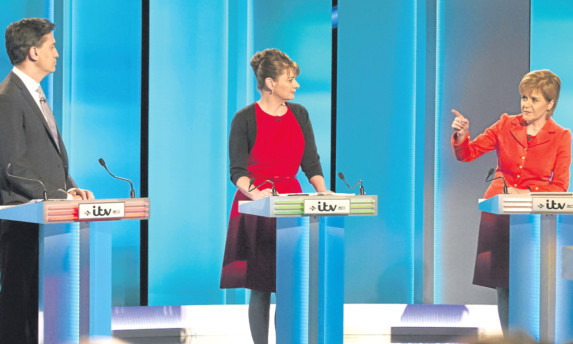
“The debate has ignited interest in the General Election, but only because they have been able to finally hear the views of the smaller parties.”
Thursday night’s TV debate between our Magnificent Seven political leaders was never going to be a major game changer.
If anything we expected a chaotic bun fight. How wrong we were.
It looked and felt more like a game show than a party political debate.
Marshalled superbly by host Julie Etchingham, who bore more than a passing resemblance to Anne Robinson, they were pressed and probed by her and the audience to find out who was the weakest link.
Surprisingly that turned out to be all three of the political heavyweights Cameron, Clegg and Miliband.
Farage played the part expected of him panto villain but it was the three wumin who were the overall champions.
They were so good on the night especially Nicola Sturgeon that if Bruce Forsyth had been presiding he would have hollered “Didn’t they do well?” and no one would have disagreed.
It was nice to see the Three Stooges mauled by the smaller parties and, while it may not change who will take the keys for Number 10, it certainly focused the electorate on how they want to see their politics delivered and democracy served.
The debate has ignited interest in the General Election, but only because they have been able to finally hear the views of the smaller parties. They realise the UK is no longer just the treasured fiefdom of The Tories, Labour and occasional Lib-Dem to carve up.
It’s a new generation game and they are sick and tired of always having to choose between one or the other of the big two.
If it plays out as I expect, many parties with very different ideals will make up the benches. That of course is what real democracy should be about of the people for all the people.
But the sad reality is that, because of the big two’s stubborn refusal to change the first past the post system, every General Election leaves almost half the electorate disenfranchised.
In recent years that has almost single-handily fuelled the desire for independence here in Scotland, the rise of nationalism in Wales, a love for the Greens, and the almost frightening upsurge of support for UKIP. It has also kept the Lib-Dums, who are supporters of change, well away from ever forming a government of their own, even when their support was at its highest.
Neither Labour nor the Tories have an appetite for change. They seem happy to accept that if they don’t get the number of seats required this time round they’ll go at it again next time.
That riles me because even if one of them does creep past the post, large swathes of these isles will not have voted for them, and even if a coalition is agreed it won’t have been what was originally put before the electorate.
Proportional representation has to be adopted. The people should be properly spoken for.
I won’t bang on about Scotland never getting the party it voted for, but in all honesty while Scotland is still part of the UK, I would like to cast my vote knowing that even if my local candidate doesn’t win, but there is a stack of votes across the country for that party, they will be represented in Westminster.
That can play both ways. If 2010’s voting numbers were crunched and seats given out on a PR basis the Lib-Dums would have had a lot more seats, as would the SNP.
Unfortunately UKIP and the vile BNP would also have seats, as would the Greens. Labour would have won but at least it would have been a fairer and more reflective result.
As it is, a UK electorate that supports a fairer system will just have to hope one of the big two doesn’t manage to scrape home with a majority in order that they can be heard.
As Bruce would say: “You get nothing for a pair! Cuddly toy, cuddly toy!”

Enjoy the convenience of having The Sunday Post delivered as a digital ePaper straight to your smartphone, tablet or computer.
Subscribe for only £5.49 a month and enjoy all the benefits of the printed paper as a digital replica.
Subscribe